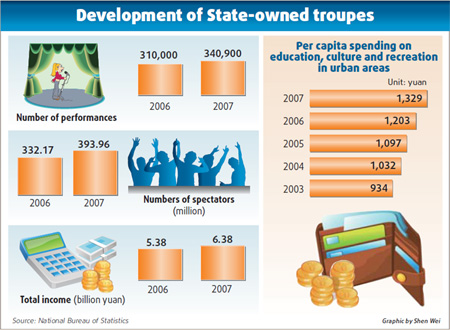
|
CHINA> Focus
 |
|
Peking Opera troupes take bold steps to be profitable
By Liu Jie and Hou Qingyang (China Daily)
Updated: 2009-06-22 10:49 Market-oriented "This kind of project-oriented cooperation would have been unimaginable before the market-oriented reform process," said Hu Huiling, a Shanghai Jiaotong University professor who specializes in China's cultural industry. "Now (after reform) we have got the right to design products independently; but since we cannot get fiscal support anymore, we are forced to make every effort to cater to the audience and become competitive in terms of products, services and business operations," Zhang Yu, the general manager of China Arts and Entertainment Group, said during a recent interview to CCTV. Wang Hongbo said raising funds from the market meant that the company was free to devise a long-term development strategy instead of coping with short-term issues like balancing its meager budget. To all intents and purposes, the move out of the government's shadow seems to be paying off. According to the National Bureau of Statistics, from 2006 to 2007, the peak period when State-owned troupes around China started to embrace market-oriented reforms, the number of performances went up 9.97 percent, from 310,000 times to 340,900 times. The total revenue of these State-owned troupes also surged 18.72 percent, from 5.38 billion yuan to 6.38 billion yuan. Data from China's Ministry of Culture showed that in 2004 there were 90 Peking Opera troupes, and their combined income was less than 45 million yuan. Though they were then massively subsidized by the state, audience numbers had started dwindling. But the trend has reversed post reform and many troupes have started to make money. The China National Peking Opera Company gets 2 million yuan from the operators of the Mei Lanfang Grand Theater for 100 performances each year from 2008 to 2012. Retaining good artistes requires market-oriented pay system "I have never seen the Peking Opera in so magnificent a building," said Wang Jianmin, a 58-year-old Beijinger and loyal Peking opera fan, whose son gave him tickets for a performance during this year's Spring Festival. "But the ticket rates are expensive; I prefer to watch it at Changheyuan where each ticket costs only 50 yuan." The more pressing concern, however, is how to retain good artistes, and that is an issue the troupes should ponder seriously, professor Hu said. "In the past, the salary was fixed under a system formulated by the government; the market mechanism has made the payment system disparate, resulting in competition within the industry," Hu said. "But management of actors, who are usually emotional people, is not easy. In addition to money, more chances to perform, encouragement and open communication should be fostered," Hu said. Wang Ying, the general manager of China Children's Arts Troupe, said her company has adopted a flexible salary system in line with performance metrics and a top artiste at her company can earn more than 10,000 yuan per month, compared to a monthly income of 2,000 to 3,000 yuan under the State-subsidy regime. The annual salary and insurance expenses for its 100-plus employees surged from 2 million yuan in 2003, a year prior to the market reform, to more than 7.5 million yuan last year. From a cultural unit supported by the central government, the troupe turned into a joint venture company in late 2004. Its five shareholders - the Beijing Youth Daily, Cultural Facility Operation and Management Center under the Beijing Ministry of Culture, the TV Industry Development Center of Beijing Television Station, High School Property Development Co Ltd of Beijing Education Commission, and the Beijing Cultural Development Center - have invested 40 million yuan cumulatively in the venture. The China Children's Art Troupe gave 303 performances in 2006, generating 55 million yuan in revenue. It did 398 shows in 2007 and 666 in 2008, with income touching 62.64 million yuan and 75.60 million yuan, respectively, for both years. The troupe last year performed the children's fictional play Fuwa, based on the mascots of the Beijing Olympic Games. The play depicted how the five fuwas united to overcome difficulties and challenges and make the world peaceful and harmonious. Later, the company built several small-sized Fuwa amusement parks catering to children in Beijing, China's capital city. The revenue from this business alone has the potential to make up one-fourth of its income going forward, insiders said.

|
无码人妻精品中文字幕免费东京热 | 在线中文字幕精品第5页| 亚洲大尺度无码无码专区| 久久精品天天中文字幕人妻| 国产精品久久久久无码av| 亚洲AV永久无码精品水牛影视| 中文字幕在线视频播放| 久久久久久无码国产精品中文字幕| 亚洲动漫精品无码av天堂| 高清无码v视频日本www| 中文字幕手机在线视频| 久久影院午夜理论片无码| 欧洲无码一区二区三区在线观看| 久久亚洲AV无码精品色午夜| 久久五月精品中文字幕| 久久99中文字幕久久| 中文字字幕在线一本通| 亚洲精品无码AV中文字幕电影网站| 国产成A人亚洲精V品无码性色| 午夜亚洲AV日韩AV无码大全| 国产精品99久久久精品无码| 最近最新中文字幕视频| 日本精品自产拍在线观看中文| 欧美日韩中文国产一区| 7777久久亚洲中文字幕| 无码中文av有码中文a| 亚洲av中文无码乱人伦在线r▽ | 无码人妻一区二区三区免费看| 国产成人无码av| 一本色道无码道DVD在线观看| 日韩人妻无码一区二区三区| 无码成人精品区在线观看| 亚洲伊人久久综合中文成人网 | 无码人妻精品一区二区三18禁 | 久久久久无码精品国产app| 国精无码欧精品亚洲一区| 高清无码视频直接看| 人妻丰满?V无码久久不卡| 久久久久亚洲av成人无码电影| 中文字幕无码不卡免费视频| 最近中文字幕大全免费版在线 |